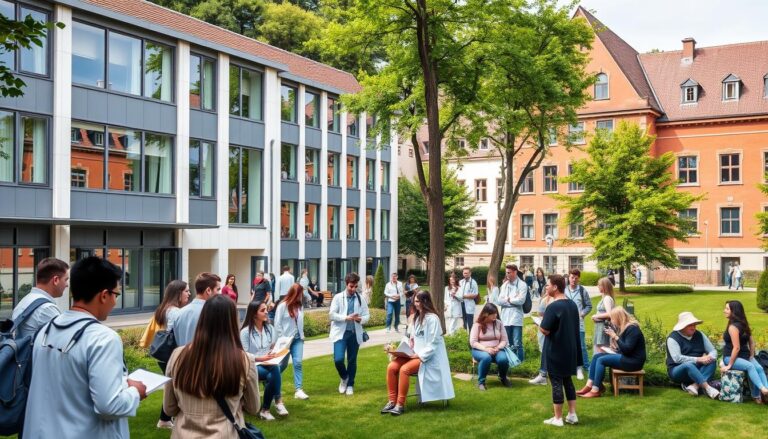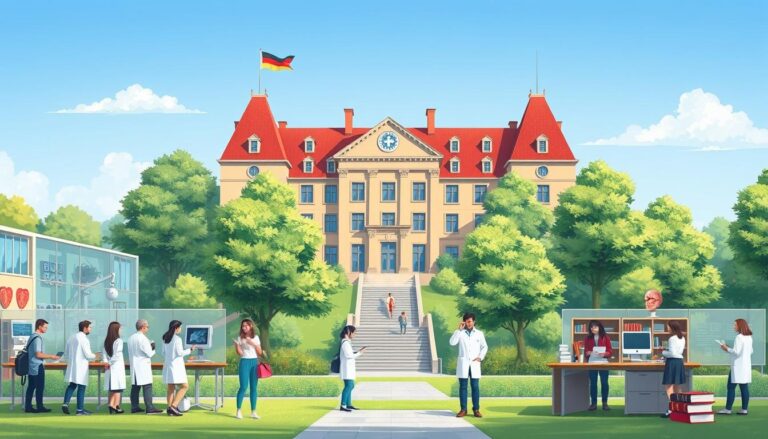Becoming a doctor without breaking the bank is possible in Germany. Many international students, including Indians, study MBBS there for free. Let’s explore this exciting opportunity in one of Europe’s top education hubs.

Germany is known for quality education, especially in medicine. Public universities offer tuition-free MBBS programs, attracting Indian students seeking world-class medical education and opportunities for MBBS abroad without NEET.
Students only pay for living expenses like housing, food, and health insurance. The overall cost is still lower than in many countries. Scholarships and part-time work options make financing your medical education easier.
Key Takeaways
- Public universities in Germany offer tuition-free MBBS programs for international students.
- Indian students can study MBBS in English at many German universities.
- NEET is mandatory for Indian students pursuing MBBS in Germany.
- Living expenses in Germany range from 800 to 1,200 euros per month.
- Numerous scholarships are available for international medical students in Germany.
- Part-time work options help students manage their living expenses.
- Job prospects after completing MBBS in Germany are highly favorable.
Introduction to MBBS in Germany
Germany offers Indian students a chance to study medicine in a world-class setting. German medical universities are known for top-notch education and research facilities. Let’s see why Germany is becoming popular for MBBS abroad.
Overview of German Medical Education
The MBBS program in Germany lasts 6 years and 3 months. It includes pre-clinical studies, clinical training, and practical placements. Non-German speakers may need an extra year for language preparation.
| Program Component | Duration |
|---|---|
| Pre-clinical Stage | 2 years |
| Clinical Stage | 3 years |
| Practical Year | 1 year 3 months |
| Language Preparation (if needed) | 1 year |
Benefits of Studying MBBS in Germany
German medical universities offer many perks for international students:
- High-quality education recognized worldwide
- Access to advanced medical facilities
- Affordable tuition fees (often ranging from INR 5 to 11 lakhs per year)
- Internship opportunities with stipends of €20,000 to €30,000
- Over 30 universities offering medical degrees
Why Germany is Popular for International Students
Germany attracts 262,114 students for medical studies. Its appeal lies in affordable living costs and excellent research opportunities. For Indian students, Germany’s low education costs make it an attractive option.

German medical universities focus on practical training and research. They prepare students for successful careers in global healthcare. Quality education and affordable costs make Germany ideal for studying medicine abroad.
Understanding the German Education System
Germany’s education system is known for its excellence and structure. Higher education includes universities, applied sciences universities, and art and music colleges. Medical education, including MBBS, falls under university programs.
German universities focus on research, practical experience, and independent study. This approach prepares students for medical careers. It fosters critical thinking and hands-on learning, essential for future doctors.

- MBBS program duration: Approximately 6 to 7.5 years, including a 1-1.5 year internship
- Course structure: Divided into pre-clinical phase, clinical phase, practical year, and state examination
- Examination system: Three major exams (M1, M2, M3) spread throughout the course
- Language of instruction: Primarily German, with limited English options
- Admission requirements: Academic records, language proficiency, and entrance exam scores
| Aspect | Details |
|---|---|
| Public Universities | Nominal semester fees (€100-500) |
| Private Universities | Annual fees €28,000 or higher |
| Living Expenses | €14,300-16,500 annually |
| Part-time Work | Up to 20 hours per week allowed |
Over 400,000 international students are enrolled in German colleges. This shows the global appeal of Germany’s education system. For Indian students, MBBS in Germany offers world-class knowledge and skills.
Eligibility Criteria for MBBS in Germany
German universities have specific requirements for MBBS programs. International students must meet these criteria to study medicine in Germany. Let’s look at the key requirements.
Academic Requirements
Students need a 10+2 education focusing on Physics, Chemistry, and Biology. A minimum 60% score in these subjects is usually required. Indian students often need NEET scores for admission.
Language Proficiency
German language skills are vital for MBBS studies in Germany. Most universities ask for TestDaF or DSH test results. Some programs may accept English tests like IELTS or TOEFL.
Entrance Exams
Not all German universities have separate entrance exams. Some may require extra tests to assess medical study aptitude. These tests might cover biology, chemistry, and physics.
| Eligibility Criteria | Requirements |
|---|---|
| Age | Minimum 17 years old |
| Academic Score | 60% or more in PCB |
| Language Tests | TestDaF, DSH, IELTS, or TOEFL |
| Entrance Exam | NEET (for Indian students) |
Meeting these criteria is the first step for admission to German universities. Students should review their chosen schools’ specific requirements carefully. This ensures a smooth application process.
Top Medical Universities in Germany
Germany has some of the world’s best medical schools. They offer excellent education for future doctors. Here’s a list of top universities for MBBS in Germany.
These schools have cutting-edge research facilities. Their programs are recognized worldwide. Many offer MBBS in English, helping international students study medicine in Germany.
| University | Location | Program Duration | Language of Instruction |
|---|---|---|---|
| Heidelberg University | Heidelberg | 6 years | German (Some courses in English) |
| Charité – Universitätsmedizin Berlin | Berlin | 6 years | German |
| Ludwig Maximilian University of Munich | Munich | 6 years | German |
| Technical University of Munich | Munich | 6 years | German (Some courses in English) |
| University of Freiburg | Freiburg | 6 years | German |
These universities are famous for their modern facilities. They have experienced teachers and high academic standards. Students learn theory and get hands-on clinical experience.
The best MBBS programs in Germany last six years. This gives students time to develop medical skills and knowledge.
Most programs are taught in German. Some universities offer courses in English for international students. Check each university’s language rules before applying.
German skills are often needed for clinical practice and talking to patients. Make sure you meet the language requirements for your chosen program.
How to Do MBBS in Germany for Free
Many international students dream of studying MBBS in Germany for free. Germany’s free education policy opens doors for aspiring medical professionals worldwide. Let’s explore how you can turn this dream into reality.
Public Universities with No Tuition Fees
Germany’s public universities offer MBBS programs without tuition fees. Over 30 institutions provide this opportunity to study medicine for free. Some universities charge about 1500 EUR per semester, still lower than many other countries.
Scholarship Opportunities
Several scholarships are available for international students pursuing MBBS in Germany. These include:
- DAAD Scholarship Programs
- Deutschland Stipendium National Scholarship Programme
- Konrad-Adenauer-Stiftung Scholarships
- Heinrich Böll Foundation Scholarships
Work-Study Options
Students can work part-time to cover living expenses while studying. German law allows international students to work up to 20 hours per week. This helps manage costs like rent, food, and health insurance.
Monthly expenses average around €750. Here’s a breakdown:
| Expense Category | Average Monthly Cost (EUR) |
|---|---|
| Rent and Utilities | 325 |
| Food and Drink | 170 |
| Health Insurance | 80 |
| Other Expenses | 175 |
Free education, scholarships, and work-study options make MBBS in Germany affordable for international students. These opportunities help students manage their expenses while pursuing their medical dreams.
Application Process for MBBS in Germany
Applying for MBBS in Germany involves several steps. Start by choosing universities that align with your goals. Top medical schools like Heidelberg University and Ludwig-Maximilians-Universität München are great options.
Prepare essential documents for your application. These include academic transcripts, language certificates, and NEET scores. English proficiency is crucial as it’s the language of instruction.
Apply through uni-assist or directly to universities. Key deadlines are July 15th for winter semester and January 15th for summer semester.
- Winter semester deadline: July 15th
- Summer semester deadline: January 15th
Some universities may require entrance exams or interviews. Be ready for these additional steps. The visa process takes 6-12 weeks, so plan ahead.
Public universities offer free tuition. However, you’ll need to show proof of funds for living expenses. This amounts to about €11,200 per year.
Look into scholarship opportunities like DAAD or Erasmus+ to support your studies. These can help ease the financial burden of studying abroad.
German Language Requirements for MBBS
German proficiency is crucial for MBBS studies in Germany. Most medical courses are taught in German. Let’s explore the language requirements and preparation options for aspiring medical students.
Importance of German Proficiency
MBBS programs in Germany are primarily taught in German. Strong language skills are vital for understanding lectures and interacting with patients. German is essential for daily life and practical training, even in English-taught programs.
Language Preparation Courses
Many universities offer German courses for international students. These programs help build the necessary language skills for medical studies. Some schools provide intensive summer courses to fast-track language learning.
TestDaF and DSH Exams
Students must pass either the TestDaF or DSH exam to prove German proficiency. These tests assess reading, writing, listening, and speaking skills. A high score is often required for admission to MBBS programs.
| Exam | Skill Areas | Score Required |
|---|---|---|
| TestDaF | Reading, Writing, Listening, Speaking | TDN 4 in all sections |
| DSH | Reading, Writing, Listening, Speaking | DSH-2 or DSH-3 |
Preparing for these exams requires time and dedication. Start your language studies early to meet the proficiency requirements. This will help ensure success in your chosen MBBS program in Germany.
Cost of Living in Germany for MBBS Students
Living expenses in Germany vary based on city and lifestyle. Public universities offer free tuition, but students must budget for daily costs. Let’s explore the typical expenses for MBBS students in Germany.
Monthly living costs range from €800 to €1,200. This covers housing, food, health insurance, and transport. Big cities are pricier, but smart choices can help manage expenses.
| Expense Category | Monthly Cost (EUR) | Monthly Cost (INR) |
|---|---|---|
| Accommodation | 300-500 | 27,000-45,000 |
| Food | 200-300 | 18,000-27,000 |
| Health Insurance | 80-120 | 7,200-10,800 |
| Transportation | 70-100 | 6,300-9,000 |
| Miscellaneous | 150-180 | 13,500-16,200 |
Many students choose shared housing or university dorms to cut costs. These options can greatly reduce housing expenses, often the biggest part of living costs.
Students can work part-time for up to 20 hours weekly. With average wages at €8 per hour, this can help cover expenses.
Careful budget planning is key for MBBS students in Germany. The yearly living cost is about €6,000. This equals roughly 50,000 INR monthly, offering great value for the quality of life and education.
Student Visa Process for Germany
Germany offers excellent opportunities for international students to study MBBS. Getting a student visa is crucial for starting medical education. Let’s explore the key steps and requirements for obtaining a German student visa.
Required Documents
Students need several important documents for their visa application:
- Valid passport
- University admission letter
- Proof of financial resources (11,208 Euros in a blocked account)
- Health insurance certificate
- Completed visa application form
- Recent passport-sized photographs
- Academic certificates and transcripts
Application Procedure
The visa application process usually takes 3 to 6 months. Students must submit their documents to the German embassy or consulate in their home country.
The application fee ranges from 30 to 75 Euros. After submission, applicants wait for a confirmation letter and possible interview invitation.
Visa Interview Tips
When preparing for the visa interview, students need to:
- Review their application thoroughly
- Practice answering common questions about their study plans
- Bring all original documents
- Dress professionally
- Arrive early to the appointment
Confidence and clear communication are vital during the interview. Being well-prepared increases the chances of a successful visa application.
Following these steps can help students secure their visa for studying MBBS in Germany. Good preparation is key to a smooth application process.
MBBS Curriculum and Duration in Germany
MBBS in Germany takes 6 years and 3 months for German-fluent students. Non-German speakers need an extra year for language prep. The program, “Medizin” or “Humanmedizin,” has four main stages.
Here’s a breakdown of the MBBS duration in Germany:
- Foundation stage: 2 years
- Clinical stage: 3 years
- Practical year: 1 year and 3 months
- State examination and licensing: Final stage
The curriculum covers key subjects like anatomy, biochemistry, and physiology. It also includes pharmacology, surgery, internal medicine, gynecology, and pediatrics. Students must pass state exams throughout the six-year period.
Germany welcomes about 10,000 new medical students yearly. There are 35 public medical colleges serving around 80,000 students. The country offers quality education at affordable rates.
Germany reserves 10% of medical seats for international students. After graduation, job prospects are promising. The country’s healthcare system offers great opportunities for new doctors.
Career Prospects After MBBS in Germany
An MBBS from Germany opens many doors worldwide. The degree is globally recognized, allowing graduates to practice internationally. German medical degrees offer vast and varied opportunities for international students.
As a licensed doctor in Germany, you’ll find numerous career paths. Hospitals, private practices, and research institutions offer exciting possibilities. The German healthcare system provides competitive salaries and growth opportunities.
To practice medicine in Germany, you’ll need to meet specific requirements:
- Obtain a valid full or temporary license
- Achieve B2 level German language proficiency
- Complete 9-10 months of general German courses
- Undergo 2-3 months of medical German training
Specialization requires 5-6 years of additional training. This includes an oral exam with three physicians. After 21 months of practice, you can get a permanent work permit.
The German medical field is thriving with over 421,000 doctors. Patient care is top-notch in this environment. The number of international doctors has doubled recently, creating a diverse workplace.
Conclusion
Germany offers Indian students a chance for top-notch medical education at low cost. It’s a popular choice, with over 400,000 international students, including 42,997 from India last year. Germany stands out for its quality education and research opportunities.
The 6-year MBBS program in Germany includes a 1-year internship. Public universities charge only €100 to €500 per semester. Living costs average €783 monthly for rent, food, and transport.
Studying MBBS in Germany has its challenges, like learning German and meeting strict admission rules. However, the benefits are worth it. Germany offers over 50 medical specializations to choose from.
Post-graduation salaries average 68,300 EUR/year, promising a bright future. Indian students should consider this path for a rewarding medical career in Europe.





